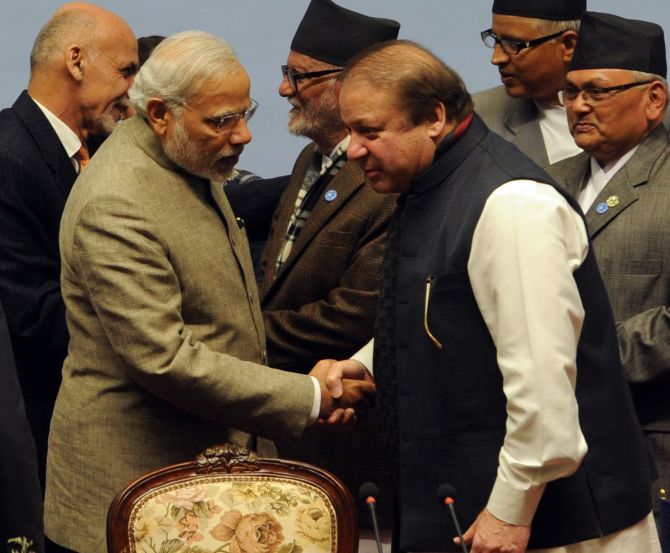Pakistan's main objective will be to shepherd India toward resumption of talks, preferably with American monitoring,' says Ambassador M K Bhadrakumar.

All three wings of India's ruling elite have spoken on the terrorist attack on the Uri army base on Sunday -- the Rashtriya Swayamsevak Sangh, the Bharatiya Janata Party and the government.
Former RSS spokesman Ram Madhav, who is on a deputation to the BJP, spoke by far in the harshest tone. He remarked: 'The prime minister has promised that those behind the Uri terror attack will not go unpunished. That should be the way forward; for one tooth, the complete jaw.'
Madhav added that the 'days of strategic restraint are over. If terrorism is the instrument of the weak and coward, restraint in the face of repeated terror attacks betrays inefficiency and incompetence. India should prove otherwise.'
Madhav hoped to convey that the Hindu nationalist government is tough as nails. He probably intended to boost the sagging morale of the core constituency of the Sangh Parivar.
BJP President Amit Shah said in a statement that the Modi government is moving in the right direction. 'Pakistan is trying to cause instability in India by constantly trying to lend support to terrorism and terrorist outfits. India has been constantly fighting against terrorism and this fight is now at a decisive stage,' he said.
Shah's primary concern will be the political fallout for the BJP, since one main plank on which Modi sought the mandate in the 2014 Lok Sabha polls was national security. That is now in shambles.
Social network sites are awash with caustic remarks about the PM. Shah cannot but weigh the impact of it all on forthcoming state assembly elections, especially in Uttar Pradesh.
On the government's part, Modi and Union Home Minister Rajnath Singh made statements. Modi said the perpetrators of the attack will not go unpunished, which is his trademark remark whenever terrorist attacks take place.
Rajnath said, 'There are definite and conclusive indications that the perpetrators of Uri attack were highly trained, heavily armed and specially equipped.'
Neither Modi nor Rajnath mentioned Pakistan or resorted to Madhav-style bombastic rhetoric.
The government finds itself between the rock and a hard place.
The point is the Pakistani military also has a plan of action ready to meet any Indian moves across the Line of Control. Which means that any Indian move will trigger a Pakistani counter-move, and it will be impossible to judge the likely balance sheet.
On the other hand, despite the government's sustained public diplomacy to create an impression in domestic opinion that its foreign policies have burnished India's international standing and image and so on, in reality, India's actions -- especially any military moves -- will come under close scrutiny and be weighed in terms of international law and the United Nations Charter.
The bottom line is that the present ruling elites dare not think of crossing any 'red line' that Washington demarcates.
The US State Department, in a series of statements, has distanced Washington from the Indian positions with regard to the situation in the Kashmir valley, India-Pakistan tensions and Balochistan.
Conceivably, the Americans have cautioned our leadership already against making any precipitate military moves. The kind of brazen military adventures that many self-styled Indian defence analysts are espousing will not get Washington's approval.
As the Barack Obama administration tiptoes toward the lame-duck period, the last thing Washington wants as legacy is an India-Pakistan conflict.
Things are moving in this direction already. Obama has scheduled a meeting with Pakistan Prime Minister Nawaz Sharif on Tuesday, September 20. American diplomacy has interjected at the highest level to mediate the tensions.
What emerges out of the Obama-Sharif meeting will be decisive. Sharif can be expected to raise the Kashmir issue and Obama cannot but be sympathetic to the sufferings of the people in the valley.
Second, Sharif will use the opportunity to re-calibrate the Pakistan-US engagement as such. The US too will be keen to lift the ties with Pakistan out of the present trough, given its regional strategies in Afghanistan, the New Cold War, re-balance in Asia, etc.
Most important, Sharif will highlight Pakistan's willingness to settle disputes and differences, especially Kashmir, through talks. Suffice it to say, Indian ruling elites will be highly vulnerable to American pressure, despite their jingoistic posturing.
If the Americans do not want a war between India and Pakistan or any precipitate Indian military moves that violated international law, Modi cannot act otherwise.
The umbilical cord that ties the Sangh Parivar and our ruling elites to the US establishment may be invisible, but remains robust.
All things considered, therefore, Pakistan's main objective will be to shepherd India toward resumption of talks, preferably with American monitoring.
The Indian obduracy against talks is becoming unsustainable.
The situation in the valley becomes Modi government's albatross, fundamentally speaking. Unless and until the valley calms down, Pakistan keeps the upper hand.











 © 2025
© 2025